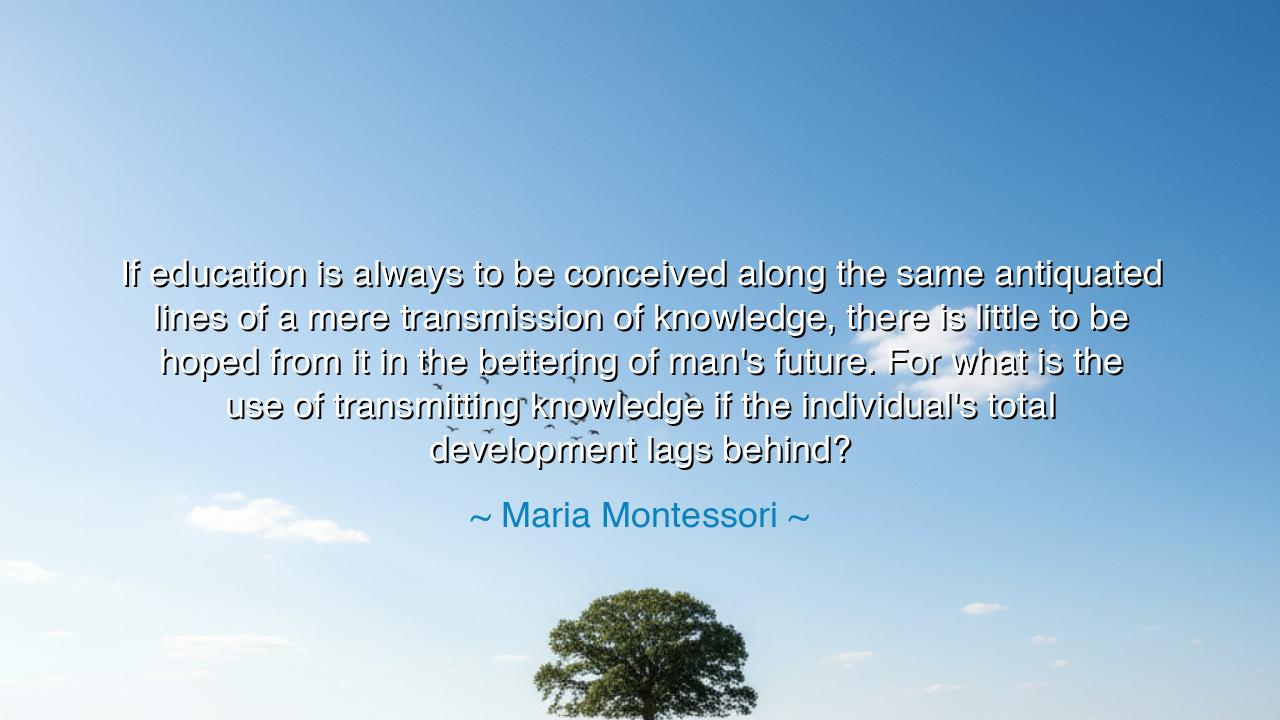
If education is always to be conceived along the same antiquated
If education is always to be conceived along the same antiquated lines of a mere transmission of knowledge, there is little to be hoped from it in the bettering of man's future. For what is the use of transmitting knowledge if the individual's total development lags behind?






“If education is always to be conceived along the same antiquated lines of a mere transmission of knowledge, there is little to be hoped from it in the bettering of man's future. For what is the use of transmitting knowledge if the individual's total development lags behind?” — Maria Montessori
Listen, O children of learning and light, to the voice of Maria Montessori, the wise mother of modern education. She spoke not as one who merely taught the mind, but as one who sought to awaken the whole of the human being — body, heart, and soul. In this saying, she warns the world against the emptiness of education that fills the head but leaves the spirit hollow. For if knowledge is passed down like a relic, without nurturing thought, curiosity, and compassion, it becomes lifeless — a burden instead of a blessing. True education, she says, must not be a chain that binds the child to the past, but wings that lift him toward the future.
The origin of these words lies in Montessori’s struggle against the rigid schooling of her age. In the early twentieth century, when classrooms were factories of memorization and obedience, she dared to imagine something higher. She observed children — their natural wonder, their hunger to explore, their quiet concentration when free to act — and she saw that the spark of learning was not lit by transmission of knowledge, but by discovery. The child, she declared, is not an empty vessel to be filled, but a living flame to be kindled. And thus she built a new path — one where education would nurture not just intellect, but the total development of the individual: the emotional, moral, and creative powers that make us truly human.
To teach only facts is to forge a sword without a handle. A man may know how to build machines, yet not how to use them for good; he may master the sciences, yet lack mercy, humility, or joy. Such a one may advance civilization in appearance, yet endanger it in truth. The tragedies of history are filled with clever minds lacking character — scholars who served tyrants, inventors who built weapons, leaders who reasoned coldly but felt nothing deeply. Montessori’s words cut through time like a warning flame: What is the use of knowledge if the soul has not grown with it?
Consider the story of the Renaissance, that golden age of rebirth. The world was bursting with learning — art, science, philosophy — yet the true Renaissance spirit was not merely a collection of facts. It was the awakening of the whole human being: Leonardo da Vinci painting and inventing, Michelangelo carving beauty from stone, Galileo gazing into the heavens with both intellect and wonder. These were not men of narrow education, but of balanced development — where curiosity met courage, and reason walked hand in hand with reverence. Their genius was not in the volume of what they knew, but in the depth of what they became.
Montessori saw that every child carries within them this same potential — the power to grow into a complete human being, not merely a clever one. The task of the teacher, then, is not to pour knowledge into the mind, but to prepare the environment where growth can unfold naturally. To let the child’s curiosity lead, to guide rather than command, to respect the rhythm of discovery — this is the sacred art of true education. For education, rightly understood, is not about the memorization of what others have thought, but the liberation of one’s own thinking.
Therefore, let this be the lesson you carry: to educate the mind without educating the heart is to build a future without hope. If schools produce only efficient workers and not wise souls, then knowledge will become a weapon, not a light. Seek not to be learned alone, but to be whole. Let your learning shape your conscience, your empathy, your vision. For only when knowledge and character grow together does the individual become strong enough to better mankind’s future.
So, my child, if ever you teach — teach not only the lessons of books, but the lessons of life. If ever you learn — learn not only to know, but to understand. Cultivate patience with your hands, compassion in your heart, and curiosity in your mind. For this is the education that endures — one that raises humanity, not just intellect. Remember Montessori’s wisdom: the true measure of learning is not how much one knows, but how much one grows. When the mind, the heart, and the spirit evolve together, then — and only then — can the world move toward the better future she dreamed of.






AAdministratorAdministrator
Welcome, honored guests. Please leave a comment, we will respond soon